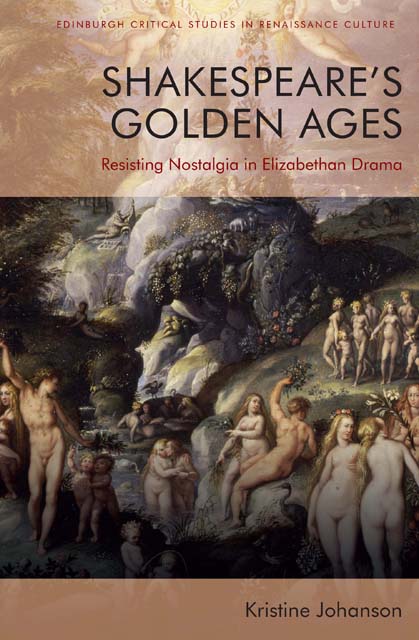Book contents
- Frontmatter
- Contents
- Dedication
- Series Editors’ Preface
- Prologue
- Note on Citation
- Introduction: Rethinking Nostalgia
- 1 Against Nostalgia: Looking Forward to the Future in the Queen’s Men’s Plays and Marlowe’s Tamburlaine
- 2 What Merry World in England? Nostalgic Paroemia and The Second Part of Henry VI
- 3 In the Mean Season: Richard II’s Absent Hospitality
- 4 The Lessons of Nostalgia in Julius Caesar and Sejanus
- Conclusion: Resisting Nostalgia
- Bibliography
- Index
Introduction: Rethinking Nostalgia
Published online by Cambridge University Press: 18 November 2022
- Frontmatter
- Contents
- Dedication
- Series Editors’ Preface
- Prologue
- Note on Citation
- Introduction: Rethinking Nostalgia
- 1 Against Nostalgia: Looking Forward to the Future in the Queen’s Men’s Plays and Marlowe’s Tamburlaine
- 2 What Merry World in England? Nostalgic Paroemia and The Second Part of Henry VI
- 3 In the Mean Season: Richard II’s Absent Hospitality
- 4 The Lessons of Nostalgia in Julius Caesar and Sejanus
- Conclusion: Resisting Nostalgia
- Bibliography
- Index
Summary
CANTERBURY […] At that very moment,
Consideration like an angel came
And whipped the offending Adam out of him,
Leaving his body as a paradise[.]
Every nostalgia needs an origin point: a time to return to, a moment of rupture and creation. In Henry V (1599), Shakespeare's eponymous king seems himself to represent just such an origin, as he no longer possesses ‘the offending Adam’ that marks his post-lapsarian state. The moment of Consideration's appearance and of ‘whipping’ rewrites historical decline as progress; Henry's body, remade as ‘a paradise’, implicitly negates any longing for Eden. From the play's start, then, the Bishops of Ely and Canterbury illustrate how Henry ‘is full of grace and fair regard’, ‘a true lover of the holy Church’ whose dramatic, unlooked-for change can only be understood as a consequence of time's passing, since ‘miracles are ceased’ (1.1.22, 23, 67). In Henry Shakespeare appears to fashion an ideal ruler upon whom disgruntled Elizabethans could focus their desires and fantasies for a youthful, male monarch, the play seeming to offer a paean to a legendary king, a synecdochal image of an imperial England leading a united Britain. Consistently made to contrast the French nobles’ feminine-coded vanity, plain Henry rejects ‘idol ceremony’, casts himself with his soldiers as ‘warriors for the working-day’, and can only speak ‘plain soldier’ to Princess Katherine (4.1.237, 4.3.109, 5.2.150). Alongside this ‘mirror of all Christian kings’, the play consistently praises ancient Rome and likens England to its ideal (2.0.6). Henry is like ‘the Roman Brutus, / Covering discretion with a coat of folly’; Fluellen lauds those like Captain Jamy who have ‘the Roman disciplines’ and laments Gower's ignorance of Pompey the Great (2.4.37–8, 3.2.73, 79, 4.1.69–72). England itself seems a new Rome, as upon the king's return to London, ‘The Mayor and all his brethren in best sort, / Like to the senators of th’antique Rome […] / Go forth and fetch their conquering Caesar in’ (5.0.25–6, 28). But the play also intimates an ambivalence about Rome's influence, as ‘Caesar’ carries implicitly the idea of ‘tyrant’, and elsewhere the idealisation of Rome is made ridiculous.
- Type
- Chapter
- Information
- Shakespeare’s Golden AgesResisting Nostalgia in Elizabethan Drama, pp. 1 - 34Publisher: Edinburgh University PressPrint publication year: 2022



